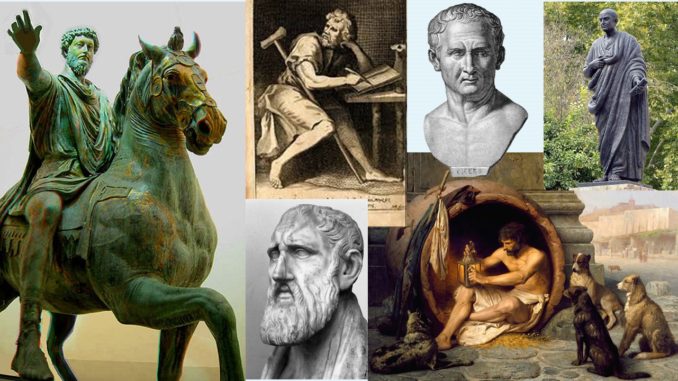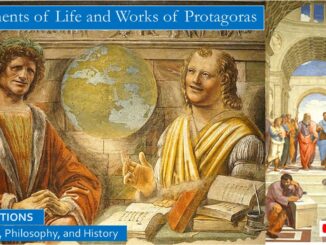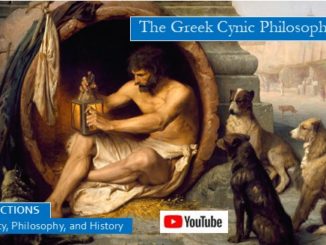
These quick book reviews include links to our YouTube videos and blogs on the Stoic and Greco-Roman philosophers.
The Greek Stoic and Cynic philosophers we discuss include:
- Zeno of Citium, first Greek Stoic Philosopher.
- Diogenes of Sinope.
- Antisthenes.
- Crates, Zeno’s teacher.
- Hipparchia, who married Crates.
The Roman Stoic philosophers we discuss include:
- Epictetus, who was a former slave of a former slave.
- Seneca.
- Emperor Marcus Aurelius.
- Epicurus, whose philosophy we view as Stoicism Lite.
- Plutarch.
- Cicero.Notice: Many older works can be found for free on the internet.
GREAT COURSES: Practical Philosophy: The Greco-Roman Moralists
I first learned of Epictetus from a series of Teaching Company lectures on Greek Moral Philosophers by Professor Timothy Luke Johnson. This a series of lectures that deeply affected me. The similarities between the stoic philosophers and the writings of the monastic eastern Church Fathers who preceded St Benedict, and to the Pauline Epistles and the Gospels, are so striking that I can truly say I am a better Christian for having read the Stoic Philosophers.
Quoting an opening paragraph in the study guide, “Readers looking neither for sublime language nor complex theories but for wisdom have long known that that Seneca, Marcus Aurelius, and Epictetus are worth reading. Those fortunate enough to encounter them either in their schooling or on library shelves have heard these ancient moralists speak with remarkable freshness and force to the basic issues of human character with which we all must struggle. For such readers, the popular philosophers of the Greco-Roman world deserve their self-designation as doctors of the soul. Precisely because they focus so precisely on everyday life, the character of the individual and the health of the family,” their ideas are as fresh today as they were millennia before. “They analyze the passions of fear and desire, of envy and rage with brilliant insight. They precisely delineate the virtues and vices. They understand the process of moral development and the necessity of moral education.”
After listening to these lectures, I spent many months reading the works of the Stoic Philosophers. Both Stoic Philosophy and Early Christianity grew from the same Greek soil. Have you ever noticed that the New Testament sounds similar to the Old Testament, but not quite? Stoicism is the second influence on Christianity, or perhaps they influenced each other. The writings of the Early Church Fathers also sound like many of the Stoic writings. Reading the stoic philosophers will deepen your faith and your understanding of Scriptures and the Church Fathers.
The Stoic Philosophers see philosophy as an evangelical enterprise, so they would want you to share your favorite videos with your friends and associates!
Stoic Six Pack, Epictetus and Seneca
This is an inexpensive compilation of the Stoic philosophers Marcus Aurelius, Epictetus, and Seneca. We did not like the translation they used for Marcus Aurelius, I found it difficult to understand, and I am okay with the late 1800’s translations of the Ante-Nicene Fathers, so I would purchase another translation for Marcus Aurelius.
This compilation, though inexpensive, suffers from many of the shortcomings of many inexpensive Amazon compilations. The typeface was large enough to read comfortably, so this was not a problem. Plus, there are no introductions or footnotes, and they drop the paragraph numbers that so many scholars use to refer to these ancient works. I did not find this to be a major problem, you can still refer to the chapter names, and I have listened to so many Great Courses lectures that I do not mind the lacking introduction, though it would be interesting to know more about the manuscript histories.
Epictetus (in Stoic Six Pack)
Epictetus is my favorite Roman Stoic Philosopher. The writings of Epictetus are accessible and easy to read, consisting of one maxim after another, resembling the teachings of the early Church Fathers in the Philokalia, echoing many of sayings in the Gospels and Epistles of St Paul. Many of his writings were his recollections of the sayings of his Stoic teacher, Musonius Rufus.
To Epictetus, only the good can be truly happy, only the good can truly be free, tyrants may take all you own, but they can never take your most prized possession, your freedom of will; tyrants can throw you in jail, but they can never take away the freedom of your mind; tyrants can take your life, but they can never have your soul. Epictetus, the great philosopher of freedom, was a former slave, a slave to a freed man, and was both poor and a cripple, eking out a living by teaching philosophy.
Epictetus tells us of someone who stole his lamp one night, Epictetus got the better end of the exchange. For Epictetus only lost his lamp, but he kept his faith. The man who stole his lamp, in exchange for the lamp he consented to become a thief, becoming faithless.
We include many more of the sayings of Epictetus in our video. Enjoy!
Our YouTube Video and blogs on Epictetus:
https://youtu.be/Dhd543kov-E
http://www.seekingvirtueandwisdom.com/epictetus-discourses-blog-1/
http://www.seekingvirtueandwisdom.com/epictetus-discourses-blog-2/
Seneca (in Stoic Six Pack)
Seneca and the Stoic philosophers s were the self-help gurus of the ancient world. Living a godly and moral life is all that mattered to the Stoic philosophers. In this video we ponder what Seneca tells us about how virtues are not changed by suffering, the virtue of kindness and graciousness, the healing power of forgiveness, true wisdom, and many other wise sayings of Seneca.
Philosophy is the study of wisdom, for as Seneca writes, “no man can live a happy life without the study of wisdom,” and “life is endurable even when we first begin our study of wisdom.” You must study philosophy every day, “you must persevere, you must develop new strength by continuous study, until that which is only a good inclination becomes a good habit.” “Philosophy molds and constructs the soul; it orders our life, guides our conduct, shows us what we should do and what we should leave undone; philosophy sits at the helm of our ship and directs our course as we waver amid the uncertainties of life. Without philosophy, no one can live fearlessly or in peace of mind. Countless occurrences every hour call for advice, and such advice is to be found in philosophy.”
We include in our YouTube video a brief biography of Seneca, including why Nero forced him to commit suicide. Seneca was an admirer of Epicurus, while Epictetus despised Epicurus, so we will discuss this paradox.
Please watch our first video on Seneca, which includes a short biography and some of our favorite wise sayings of Seneca.
https://youtu.be/wgD8skYi3I0
Our second YouTube video has more sayings from Seneca:
https://youtu.be/m4mcP2F9c4w
Please view our blogs on Seneca:
Seneca, Moral Epistles, Blog 1, Living Well, Dying Well
http://www.seekingvirtueandwisdom.com/seneca-moral-epistles-blog-1-living-well-dying-well/
Seneca, Moral Epistles, Blog 2, Stoicism and Living a Godly Life
http://www.seekingvirtueandwisdom.com/seneca-moral-epistles-blog-2-stoicism-and-living-a-godly-life/
Seneca, Moral Epistles, Blog 3, Loving Philosophy, Loving God, Loving our Neighbor
http://www.seekingvirtueandwisdom.com/seneca-moral-epistles-blog-3-loving-philosophy-loving-god-loving-our-neighbor/
Seneca, Moral Epistles, Blog 4, Stoic Concepts of Virtue and the Good
http://www.seekingvirtueandwisdom.com/seneca-moral-epistles-blog-4-stoic-concepts-of-virtue-and-the-good/
Seneca, Moral Epistles, Blog 5, On the Benefits of Friends and Keeping Score
http://www.seekingvirtueandwisdom.com/seneca-moral-epistles-blog-5-on-the-benefits-of-friends-and-keeping-score/
Seneca, Moral Epistles, Blog 6, Stoicism and the Golden Rule
http://www.seekingvirtueandwisdom.com/seneca-moral-epistles-blog-6-stoicism-and-the-golden-rule/
Seneca, Moral Epistles, Blog 7, Precious Stoic Nuggets of Wisdom
http://www.seekingvirtueandwisdom.com/seneca-moral-epistles-blog-7-precious-stoic-nuggets-of-wisdom/
Meditations (Dover Thrift Editions), by Marcus Aurelius
This thin volume does have a brief introduction, and they did retain the paragraph numbers, and very readable type, so it is a cut above many of the inexpensive Amazon inexpensive compilation books. We found this translation much easier to read that that use in the Stoic Six Pack.
Marcus Aurelius was truly the philosopher-king that Plato dreamed of, he was both one of the good Roman Emperors and a Stoic Philosopher who ruled out of a sense of duty while living the modest stoic life.
The paradox of Marcus Aurelius is that as Roman Emperor he likely oversaw the brutal persecution of Christians, but as a Stoic philosopher his main work, the Meditations, offers a Stoic philosophy that reflects many Christian values and teachings. This paradox led some ancient Christians to hope that he indeed was a friend to Christians, including Tertullian and St Justin the Martyr, who was himself martyred under the reign of Marcus Aurelius. This paradox was explored by the ancient church historian Eusebius in his work Church History or Ecclesiastical History.
We review the history behind Marcus Aurelius, how he was the adopted son of his predecessor, Antonius Pius, who had been adopted by Hadrian. We learn how his marriage to the daughter of Antonius Pius, Faustina, led to the birth of Commodus, who succeeded him as emperor and began the decline of the Roman Empire due to his neglect of his responsibilities, he preferred performing as a gladiator to serving as a stoic Roman Emperor.
Please view our YouTube videos:
Marcus Aurelius and Christian Persecutions: Friend or Foe?
https://youtu.be/-uQxq1O9xSY
Marcus Aurelius: Meditations: Stoic View of Life
https://youtu.be/0qHpReZYhv4
Please view our blogs:
Marcus Aurelius, Blog 1, Friend, or Foe, or Both, of Christianity?
http://www.seekingvirtueandwisdom.com/marcus-aurelius-blog-1-friend-or-foe-or-both-of-christianity/
Marcus Aurelius Blog 2, Others will be irritating, but not I!
http://www.seekingvirtueandwisdom.com/marcus-aurelius-blog-2-others-will-be-irritating-but-not-i/
Marcus Aurelius Blog 3 Genuine Friends Don’t Keep Scorecards
http://www.seekingvirtueandwisdom.com/marcus-aurelius-blog-3-genuine-friendships-have-no-scorecards/
Marcus Aurelius Blog 4 Be critical of yourself, be gracious towards your neighbor
http://www.seekingvirtueandwisdom.com/marcus-aurelius-blog-4-be-critical-of-yourself-be-gracious-towards-your-neighbor/
Marcus Aurelius Blog 5 Seeing life’s misfortunes through the eyes of our neighbor
http://www.seekingvirtueandwisdom.com/marcus-aurelius-blog-5-seeing-lifes-misfortunes-through-the-eyes-of-our-neighbor/
Musonius Rufus: Lectures and Sayings
The Stoic Philosopher Musonius Rufus is best known through the lectures of his marvelous student, Epictetus. Like Plato and Socrates, Epictetus tells us so many delightful vignettes and teachings of his beloved Rufus that we really cannot distinguish between the thoughts of Epictetus and Musonius Rufus.
In addition to the writings of Epictetus, a small collection of Musonius Rufus’ writings come down to us from antiquity in an anthology by the Greek Stobaeus, and a few fragments quoted in other ancient works. We know he was exiled by Nero, and came in and out of exile under the succeeding emperors, Tacitus mentions he helped negotiate several treaties, and we know he taught in Greek and that he taught Epictetus, but we know little else about the life of Rufus.
Rufus and Epictetus sound more like father and son than master and student, so close is their stoicism. The similarities between Rufus and Epictetus and the Epistles of St Paul and the writings of the early Church Fathers are amazing.
These writings are not well known, this slim volume included an introduction and the translation was very readable.
Please view our YouTube videos:
Stoic Musonius Rufus on Forgiveness, Obedience, Exile, and Living a Philosophical Life
https://youtu.be/2Ft0YOjfbP8
St Augustine, Stoic Musonius Rufus, & Ruth on Concupiscence: Love or Lust? Controlling the Passions
https://youtu.be/-wv6bVeG74A
Please read our blogs:
Musonius Rufus on Exile
http://www.seekingvirtueandwisdom.com/musonius-rufus-on-exile/
Musonius Rufus, Stoic Philosopher, Forgiveness and Obedience
http://www.seekingvirtueandwisdom.com/musonius-rufus-stoic-philosopher-forgiveness-and-obedience/
Musonius Rufus on Concupiscence and Controlling the Appetites
http://www.seekingvirtueandwisdom.com/musonius-rufus-on-concupiscence-and-controlling-the-appetites/
Lives of Eminent Philosophers, by Diogenes of Laertius
Scholars and Stoics alike wish that at least some of the intact works of the Greek Cynic and Greek Stoic philosophers, but the summaries of Diogenes Laertius, sometimes revealing, sometimes shallow, always cursory, is pretty much all that has survived, except when Seneca and the later Stoics repeat their ideas. Athens was the Berkeley of the ancient world, that the Cynics were contrarians, like our sixties flower children, minus the drugs, but with the same disregard for material success and authority figures. The Cynics were always questioning the norms of their day.
Our YouTube Video on Zeno and the Greek Stoic philosophers:
https://youtu.be/STxpGlkFyvs
Our blog:
http://www.seekingvirtueandwisdom.com/diogenese-on-the-greek-stoic-zeno-of-citium/
Like the Greek Stoic philosophers, none of the complete works of the Cynics were copied by the medieval scribes or otherwise preserved, most of what we know about the Cynics are in their chapter in the “Lives of the Eminent Philosophers” by our friend Diogenes Laertius, which means we are only told what he thought was interesting. But his preference in describing the philosophy by means of the pithy sayings and quick stories about the philosophers is well suited to drawing a picture of the Cynics.
Clarification: Diogenes of Laertius compiled the book, “Lives of Eminent Philosophers,” and the most influential and interesting Cynic philosopher in the Lives is also named Diogenes, or Diogenes of Sinope.
Our YouTube Video on Diogenes and the Greek Cynic philosophers:
https://youtu.be/zAAal5p8AX8
Our blog:
http://www.seekingvirtueandwisdom.com/diogenes-and-the-greek-cynic-philosophers/
Diogenes’ chapter on Epicurus is unique because includes long excerpts from his actual works. For the other philosophers he preserves mostly sayings and anecdotes.
In general, the Lives of Eminent Philosophers is most useful when it is the only surviving primary source for the philosopher. We plan to do videos on these other philosophers in the future.
FUTURE PLANS
We plan on future videos and blogs on works by Plutarch, Cicero, and other Stoics.




9 Trackbacks / Pingbacks